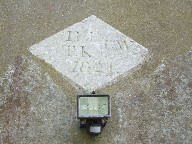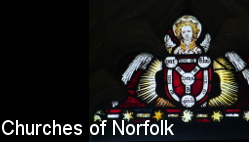| |
|
St John
the Baptist, Lakenham, Norwich Just off the outer
ring road in Norwich's dreary southern suburbia sits this
sad little church on an ancient hilltop churchyard site,
hemmed in on all sides by housing. You can't see it until
you get right up to it. Lakenham parish is long and
wedge-shaped, driving into the centre of the city. The
chapel of ease to this church, St Mark, sits close to the
inner ring road.
The
trimness of the churchyard to the north of the church
belies the fact that this building appears to be very
neglected - indeed, it had an air of being abandoned to
its fate. There were no notices, no signs of any kind.
Even the noticeboard by the gate had gone, just two
uprights remaining. Whether it had been destroyed by
vandals or the elements it was hard to say. There was, of
course, no open door, no welcome. As at Earlham on the
other side of Norwich, here you felt was a medieval
building, the touchstone down the long generations, which
was now in its last days. Perhaps there is still a
congregation, but I wondered if they now worshipped
elsewhere, because there seemed no sign that this
building had been used for a long time.
A large
and alarming porch faces the gate, initialled by the
churchwardens and dated 1824, a slightly
pre-ecclesiological time which was not a happy one for
church restorations. Perhaps this date gave the stark
brick aisle on the south side too, which at least in the
sunshine lifted the heart a little more than the
depressing, grey cement render of the north side. There
were cobwebs across all the doorways.
| Sam
Mortlock, who saw inside in the 1980s, remembered
a fine late medieval font and a grand 1807
memorial to James Crowe, Sheriff of Norwich and
twice Mayor. We tried peering through windows to
see if they were still there, but the frosted
quarries defeated us. The south
side of the churchyard was beautiful, especially
in contrast with the sad building. Heavily
wooded, it drops steeply away. And all around
there are substantial memorials of the 18th and
19th Centuries, a reminder that this parish was
home to many of Norwich's prosperous merchants
and tradesmen and their families. A large cube of
a memorial, topped by an urn, sits to the east of
the chancel, and several memorials record the
remembered's calling in life. A winged skull by
the former priest door points to all our
destinies, but saddest of all is the broken rose
stem on a headstone by the path, remembering
Martha Morgan, who died in 1814 at the age of
three.
|
|
 |
|
|
|
